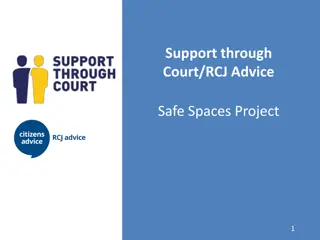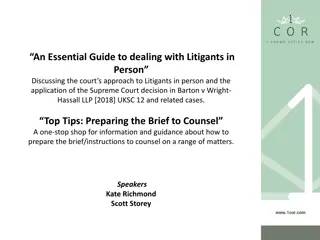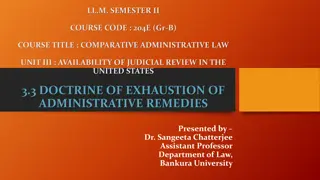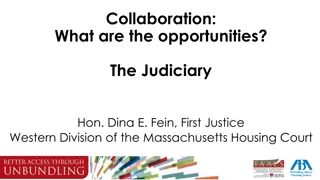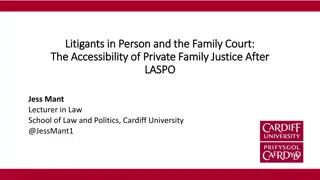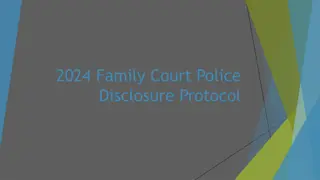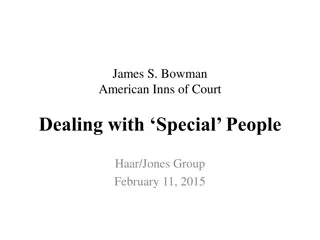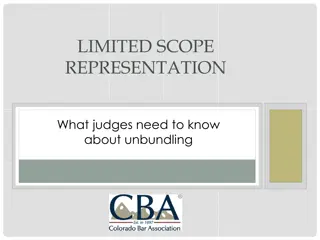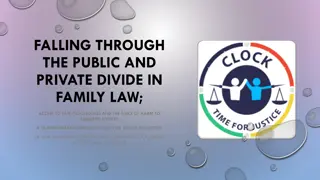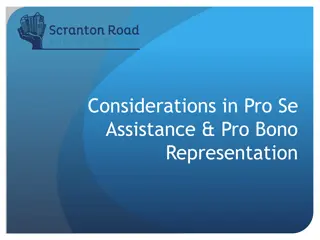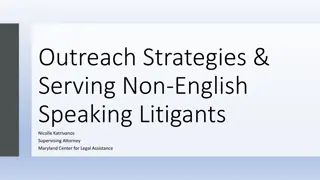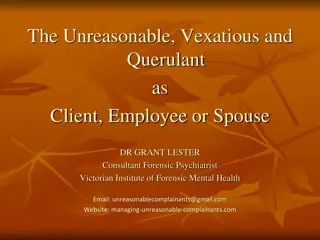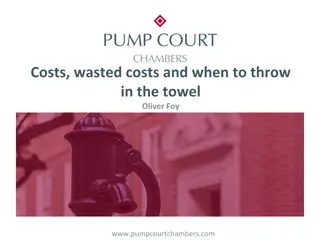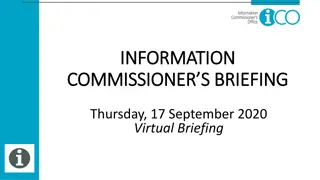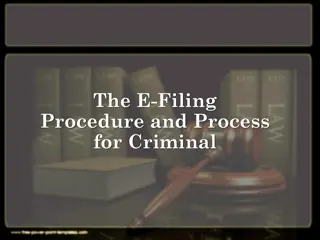Effective Supervision of Court Staff - Duties and Responsibilities
Introduction to the effective supervision of court staff, outlining the duties and responsibilities of different roles such as readers, stenographers, computer operators, and muharirs in a judicial setting. The process of supervision helps ensure smooth operations and efficient dispensation of justi
1 views • 15 slides
Support Through Court: Helping Litigants in Person Navigate Legal Proceedings
Support Through Court, a charity dedicated to supporting Litigants in Person, offers practical and emotional assistance to individuals facing family and civil court proceedings without legal representation. Through a network of offices staffed by volunteers and professionals, they provide invaluable
0 views • 22 slides
Understanding Litigants in Person: A Comprehensive Guide
Explore the court's perspective on litigants in person, with insights from the Barton v Wright-Hassall LLP [2018] UKSC 12 case. Learn about the significance of LiPs, the impact on justice accessibility, and key legal considerations pre-Barton. Gain practical tips for briefing counsel effectively. De
0 views • 19 slides
Doctrine of Exhaustion of Administrative Remedies in Comparative Administrative Law
The doctrine of exhaustion of administrative remedies requires litigants to pursue all available remedies with administrative authorities before seeking judicial review. Originating from the case of Myers v. Bethlehem Shipbuilding Corp, this doctrine aims to respect congressional intent and promote
1 views • 12 slides
Understanding the California Supreme Court Review Process
Explore the workings of the California Supreme Court in considering petitions for review, filing statistics, and the challenges faced by litigants seeking review. Learn about the criteria for selecting petitions, filing statistics, and client considerations in pursuing a petition. Discover the small
0 views • 14 slides
Enhancing Access to Justice through Limited Assistance Representation in Massachusetts
The Massachusetts Judiciary, led by First Justice Hon. Dina E. Fein, has implemented Limited Assistance Representation (LAR) to allow attorneys to assist self-represented litigants on a limited basis. This initiative aims to expand access to justice by providing legal support without full representa
0 views • 8 slides
Challenges of Litigants in Person in Family Court Proceedings
Self-representation in the family court post-LASPO has become the norm, with a majority of hearings involving at least one Litigant in Person (LIP). These individuals face various obstacles such as domestic abuse, learning difficulties, and limited access to resources. The research project sheds lig
0 views • 12 slides
Enhanced Family Court Police Disclosure Protocol for 2024
The 2024 Family Court Police Disclosure Protocol addresses key issues identified in the 2013 protocol, emphasizing timely and proportionate requests for material. Changes include a new checklist for the judiciary, guidance notes, and revised processes for litigants in person. The protocol provides c
1 views • 19 slides
Access to Justice Through Public Legal Education in Alberta
The Centre for Public Legal Education Alberta (CPLEA) is a not-for-profit organization offering plain language legal education and information to empower individuals in understanding their rights and responsibilities. Public Legal Education (PLE) helps people address legal issues independently by pr
0 views • 20 slides
Dealing with Jerks in the Legal Profession
This content discusses the challenges lawyers face when dealing with difficult individuals in the legal field, known as "jerks." It provides examples of jerk behavior, tips on differentiating them from advocates, and strategies for handling such situations professionally. The discussion delves into
0 views • 34 slides
Understanding Limited Scope Representation in Legal Matters
Limited Scope Representation, also known as unbundling, is a practice where an attorney and a client agree that the attorney will handle specific aspects of a legal matter, rather than the entire case. This approach offers flexibility, cost-effectiveness, and increased client control. Judges play a
0 views • 22 slides
Understanding McKenzie Friends and Their Role in Legal Proceedings
McKenzie Friends are individuals who provide lay assistance and support to litigants representing themselves in court. They can offer moral support, take notes, help with case papers, and quietly advise on case conduct. However, they are not allowed to act as agents for the litigants or address the
0 views • 12 slides
Falling Through the Public and Private Divide in Family Law
Exploring the impacts of the public-private division in family law, this research delves into access to fair proceedings and the associated risks to children and society. Dr. Jane Krishnadas leads the discussion on a transformative methodology for enhancing access to justice, shedding light on the c
0 views • 35 slides
Understanding Pro Se Assistance and Pro Bono Representation
This material delves into the considerations, course outlines, justifications, and constitutional basis for assisting pro se litigants and encouraging pro bono representation. It covers the need for self-representation, limitations to the right, the increase in pro se litigants, and the constitution
0 views • 51 slides
Innovative Outreach Strategies for Serving Non-English Speaking Litigants
This presentation covers outreach strategies by Nicolle Katrivanos, Supervising Attorney at the Maryland Center for Legal Assistance, focusing on serving non-English speaking litigants. The strategies include expanding services within immigrant communities through various programs and collaborations
0 views • 10 slides
Understanding Unreasonable Complainants: A Forensic Psychiatry Perspective
Explore the spectrum of complainants, from normal to unreasonable and querulant, as discussed by Dr. Grant Lester, a consultant forensic psychiatrist. Learn about the behaviors and characteristics of vexatious litigants, obsessive personalities, and those with pre-existing schizophrenia. Gain insigh
0 views • 14 slides
Understanding Costs, Wasted Costs, and When to Seek Legal Guidance
Costs in legal proceedings can be exceptional rather than routine, with specific circumstances leading to cost orders by the Tribunal. Vexatious, abusive, or unreasonable conduct can result in cost implications, including orders for wasted preparation time. Presidential guidance helps determine when
0 views • 11 slides
Information Commissioner's Briefing on Frivolous or Vexatious Requests
The briefing by the Information Commissioner covers topics such as the purpose of the PATI Act, administrative denials, Section 16(1)(e) allowing refusal of requests, and considerations for denying requests as frivolous or vexatious. The focus is on the nature of the request rather than the requeste
0 views • 30 slides
Understanding Criminal E-Filing Procedure and Document Formats
Explore the detailed process of e-filing for criminal cases, including points of interest, document format requirements, form/template modifications, and guidelines for Pro Se litigants and unrepresented parties. Learn about email designations, submission errors, and recommended practices for effici
0 views • 16 slides

